LEER CON LAS MANOS
2021
To read with the hands
A journey through the photographic work Leer con las manos, a series that explores the relationship between gaze and reading. Made for the Festival of Reading, MALBA, premiered on May 15, 2021.
To read with the hands
A journey through the photographic work Leer con las manos, a series that explores the relationship between gaze and reading. Made for the Festival of Reading, MALBA, premiered on May 15, 2021.
Practical tasks
Aída Carballo (1916-1985) was a fundamental Argentine artist. This video takes as a starting point a series of personal documents of the artist that show her activity in the local and international environment, her teaching work, some study notes, bureaucratic procedures. In the latter you can see the evolution of her signature, from childhood to adulthood and creative maturity, when her name began to be part of her work. In this work, the tracing of her manuscripts becomes a form of proximity and an attempt to repeat an alien gesture that is never achieved.
Duration: 10:40 minutes
Photographic documentation: Luci Laumann.
Camera, action and editing: Leticia Obeid.
Color correction: Sol Miraglia.
Sound post-production: Luis El Halli Obeid
Made for the exhibition: Transformation. The overflow graph. Engraving Museum, National House of the Bicentennial, February-July 2021. Curators: Silvia Dolinko y Cristina Blanco
Museo del grabado
The footprint of Saturn
This video takes footage filmed in the workshops of the National Museum of Science Bernardino Rivadavia. In it we see the hands of the scientists preparing the fossil pieces found by Argentine paleontologists for their subsequent classification and sample. It was exhibited in the individual exhibition Stone, scissors, paper, Galería Hache, Buenos Aires, 2018.
The resurrection workshop
L`Officina della resurrezione is a musical work composed by Fabián Panisello in 2013 in collaboration with italian writer Erri de Lucca who reelaborated a part of the Book of Ezekiel, Old Testament, a passage in the Bible called The valley of dry bones. My contribution was the visual work that accompanied its execution live in the main auditorium of the Reina Sofía Museum, Madrid, in February 2017, within the framework of the oficial invitation that Spain made to Argentina as guest country in the ARCO Art Fair.
The video shows a series of fossils that belong to the collections of the Museum of Natural Sciences in Buenos Aires. There, paleontological pieces of plant species, vertebrates and microorganisms that existed in the earth millions of years ago are housed. Some are native specimens, others were brought from other collections, from other parts of the world. Where the carbon of the bones and plants was replaced by silicon, the stone kept the forms and modern science has been able, in the last two hundred years, to resuscitate in some way the information that these bodies carry.
Composition: Fabián Panisello
Texts: Erri de Luca y Libro de Ezequiel
Interpreters: Holger Falk (Baritone) and PluralEnsemble
Direction: Fabián Panisello
Video: Leticia Obeid
Camara: Juan Renau
Edition: Laura Preger
Duration: 23:52 minutos
Made with the support of the Ministry of Culture of the Argentine Nation within the framework of Argentina Plataforma Arco.
Curator: Sonia Becce
Fragments of the film Alien Resurrection (1997), by director Jean-Pierre Jeunet, in which the image is shown as the basis of a sway in the soundtrack between the original version and its dubbing into Spanish.
Ghost
The video takes some scenes from the movie The Philadelphia Story, by George Cukor (1940), and overlaps the original version with the dubbed version in Spanish, achieving an effect of doubling the image andsound. Thus, the original plot based on a series of romantic doubts and disagreements, in a style of fast and sparkling dialogue, gets an extra layer of information, which can illuminate certain aspects of the meeting: the translation between languages becomes a metaphor of (in)communication in love.
Fragments of iconic North American series and movies, dubbed into Mexican Spanish.
Janus
Janus was, in Roman mythology, a two-faced god: one face looking to the past and the other to the future. Janus was the god of doorways, beginnings and endings. In this series, the book´s page behaves like Janus, going from past to future of a text or vice versa. Jano is the attempt to revise the minimum portion of time that can be frozen in movement, through image.
Sounds from behind
The video shows a dubbing class taught by Humberto Vélez, the creator of the Latin voice of Homer Simpson, in a recording studio. Filmed in Mexico City in 2011.
Bilingual
The video shows the documentation of a series of situations related to the production of a play that was performed in Germany involving a German dancer, an Argentine singer, and three Argentine musicians from a wichi community. Considering this unique event -which takes place between Berlin and Santa Victoria Este, in the province of Salta (Argentina)- as a starting point, the video develops a series of reflections and observations about the experiences and ways in which different forms of communication and cultural translation are put into play, along with its obstacles, bridges, shortcuts and challenges.
Duration 25’
Doubles compiles a series of interviews with Mexican dubbing actors, whose voices are iconic for television and film seen on Latin America from the 60s onwards. These figures tell stories about their metier, while they also develop reflections on the role of the task, the translation, the supposed neutrality of language, the relationship between image and sound, and other ideas.
Duration 10’
Edition of 5 + A.P.
One copy of Dobles was acquired by MUAC, Autonomous University of Mexico.
Juana and Fausta
A hand browses the argentine edition of Jane Eyre, Charlotte Brontë´s novel, published in a children´s collection called “Robin Hood”, very popular for generations of Argentineans. The gestures repeats with a book printed in Arabic, as a counterpoint between two languages, two ways of writing and reading . The illustrations also shows two types of aesthetics of female representation, intervened by a gesture that recreates the figure of the veil, trying to find out if stereotypes are in the picture or in our interpretation of it.
Duration 4’ 20”
Dictations
Filmed on a train ride from the center of Buenos Aires to the suburbs, the video documents the action of manually copying the “Letter of Jamaica” by Simon Bolivar, a document dating from 1815 and developing the Venezuelan´s political philosophy in the form a diagnosis and prognosis for Latin America. The tour shows the different urban, social and economic landscapes of the city of Buenos Aires and its suburbs, to rethink the ideas in this text and compare them to the present and to introduce the problem of translation between these ideas and practice. Being that a text in which Bolívar raises the possibility of turning the Spanish colonies into republics – a text written in the midst of the wars for Independence, a piece that is as much the result of careful observation and speculative thinking, as the movement itself, ie, is thought and action at a time – the idea for this video was to contrast the slowness of writing with the speed of travel, making manual copying text a way of foot traffic in the action, appropriating the words while the environment is changing.
Duration 25’ 30”
Original medium: Minidv
Camara: Julian D´Angiolillo, Julia Masvernat, Jorgelina Sanchez.
Sound recording and post-production: Hernán Kerlleñevich
Edition: Leticia Obeid
B. is a travel diary, a self-portrait, and an audiovisual essay at the same time. It was filmed in the city of Paris during 2007 using Walter Benjamin´s Arcades Project as a starting point. The video develops what Benjamin called “constellations” of data, facts and thoughts, which are connected to each other, crossing time and distance, in a concept of visual history and writing as assemblies of fragments. In this way, the story is shaped as a record of an experience of knowledge in which action, thought and gaze intersect all the time to confront literature and reality, memory and present; the city today, with its postmodern problems and its modernization of the modern dream that the city of Paris represents.
Duration: 58 minutos
Idea, camara and edition: Leticia El Halli Obeid
Sound: Pablo Chimenti/Hernán Kerlleñevich.
Original medium: Single channel video (minidv pal)
Film in París, June-October of 2007.
Produced within the framework of the program of crossed artistic residencies between Buenos Aires and Paris, with the support of the Ville de Paris, the Secretariat of Culture of the Autonomous City of Buenos Aires and the Embassy of France in Argentina
Screen
The pen portrays what he sees on the screen of the film camera on paper, in a kind of artisanal «mise en abyme».
Images filmed in a combine factory in the province of Córdoba, Argentina, dialogue with rural scenes from a children´s book illustrated with Brueghel´s paintings.
A pen comes and goes on a paper surface, scratching and making sounds that alternately zoom in and out of the camera.
A curve so giant that it seems straight
A machine harvests soybeans, stops, locks, breaks. Your operators stop to fix it.
The video mixes material filmed in 2006 during a soybean harvest in the Pampas plain, with images from the archive of a combine factory that existed in the province of Córdoba, Argentina, between the ‘50s and the ’90s. The counterpoint of materials builds a logic that recreates the body of these machines and their history, as a sign of the political and economic account of an era. In this way he investigates the boundary between documentation, art and knowledge, as well as the relationship between scale and perception.
Duration: 8’45’’
Original medium: miniDV pal
Archive footage: super 8 transferred to vhs
Idea and Camara: Leticia El Halli Obeid
Edition: Jorgelina Sánchez y Leticia El Halli Obeid
Stories
The video collects fragments of the filming of a series of people invited to describe a work of art they remember. In these stories, the description of the different works becomes an emotional account of what they try to remember, as well as a close and domestic reflection of the place of the aesthetic experience in everyday life.
Duration 6’ 56”
Astronaut
A voiceover describes a work by Vermeer, where a woman does housework while we see a person feeding a beehive in the image.
Duration 1’ 15”
In this video the word is used in typographical posters with phrases, questions, provisional conclusions derived from the realization of the project ”Relatos”.
Public reading
Video made at the request from the artist Mirtha Dermisache, documenting an inauguration of her homonymous exhibition at the Centro de España en Buenos Aires, in 2005. Edition revised by the artist.
Camara and edition: Leticia Obeid
Duration: 5’ 52” | Hi8, color, sound.


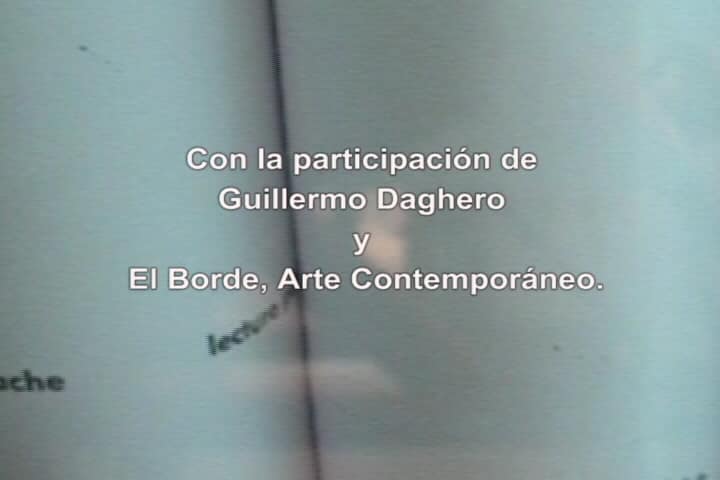
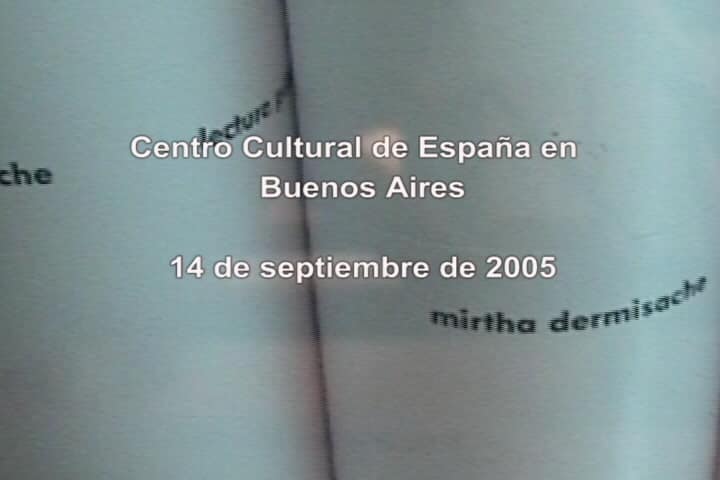
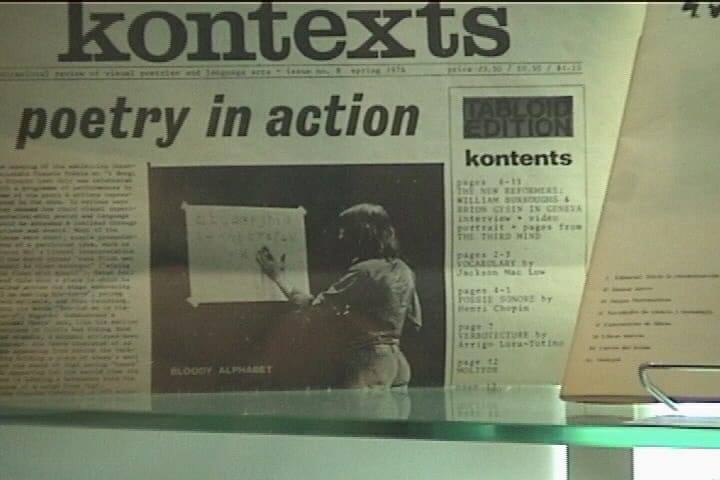
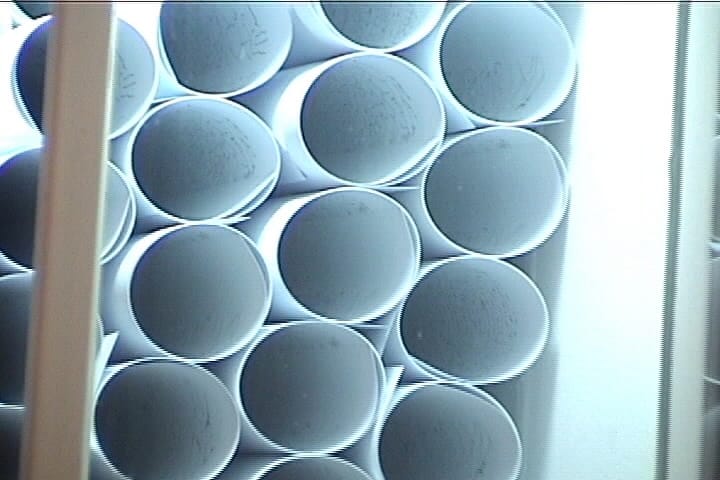
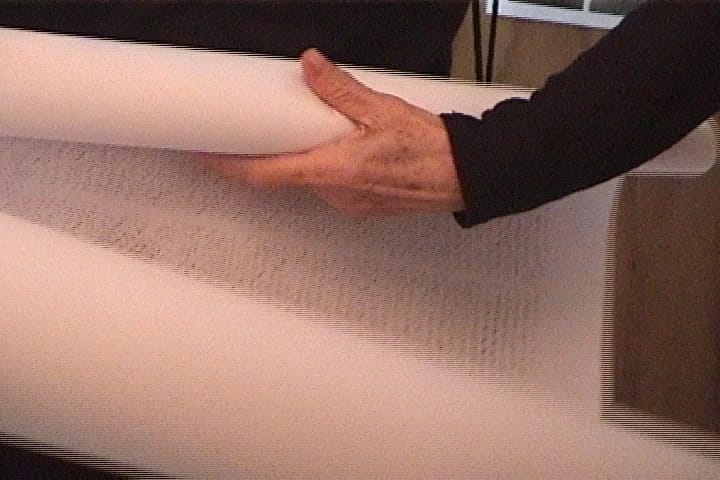
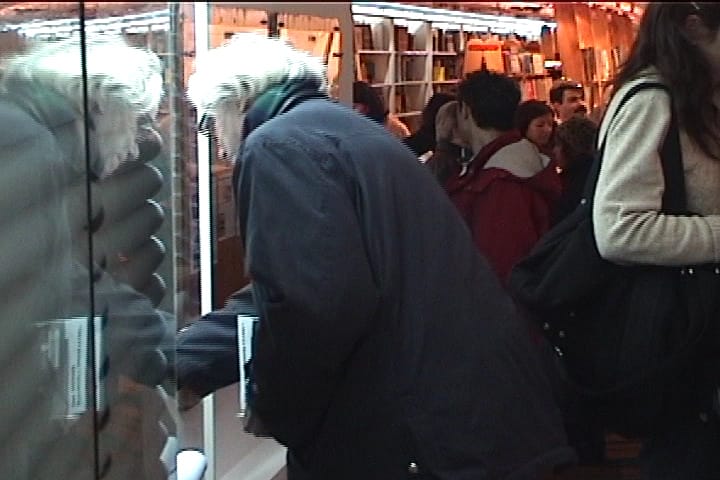
To write, to read, to listen
The video shows three consecutive scenes: a hand writes a word in Spanish that is deformed towards the phonetics of English; the search and reading of the word “autism” in the dictionary; the act of writing and drawing the word “Arrepio” (“goosebumps” in Portuguese) on paper, while a voice hums the same word.
Order
A hand writes the word "come" over and over on the same piece of paper until it starts to tear.
Model
The author of the video sings a song by The Beatles (“I´m looking through you” from the album Rubber soul, 1965) doing lipsync, while the Spanish translation appears, subtitling the image.
The video collects moments of a series of people singing their favorite song through headphones. The result is a new “song” made of the fragments. Filmed and edited at Atlantic Center for the Arts, September-October 2001.
Duration 4’ 50”
Edition 1 of 5 + A.P
Exhibited in: Festival de Nacional Cine, La Pampa, Argentina 2008. Festival CologneOFF, Alemania, programas “Image vs Music” (2006) y “Women Directors” (2009). Videografías Fundación telefónica, 2006. Atlantic Center For the Arts, U.S.A., 2001.